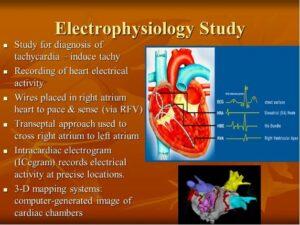The human heart, a remarkable organ responsible for coordinating the ensemble of life, depends on a complex electrical framework to preserve its beat and work. When inconsistencies in this electrical conduction happen, it can lead to a range of heart rhythm disorders, known as arrhythmias. Electrophysiology mapping has developed as a groundbreaking strategy that sheds light on the heart’s electrical activity, offering insights into the diagnosis and treatment of these beat disturbances.
Understanding Electrophysiology Mapping
Electrophysiology mapping is an advanced diagnostic strategy that empowers healthcare experts to visualize and analyze the heart’s electrical pathways in real-time. The method includes mapping the heart’s electrical signals, allowing for the identification of anomalies that may be causing arrhythmias. It gives a three-dimensional representation of the heart’s electrical activity, aiding in the exact localization of risky ranges.
The Mapping Process
Catheter Insertion:
During an electrophysiology study, specialized catheters with tiny electrodes are threaded through blood vessels and positioned within the heart. These catheters record the electrical signals generated by the heart’s cells.
Electrical Signal Recording:
As the heart beats, the catheters collect data on the timing and sequence of electrical impulses. This information is crucial for the cardiologists in Nagpur, identifying any irregularities or abnormal pathways responsible for arrhythmias.
Mapping System:
The electrical signals collected by the catheters are transmitted to a sophisticated mapping system. This system creates a visual representation of the heart’s electrical activity, often displayed on a monitor as colorful maps or patterns.
Types of Electrophysiology Mapping:
Activation Mapping:
This method records the sequence and timing of electrical signals as they propagate through the heart. Activation maps offer assistance in pinpointing the origin and spread of irregular rhythms, helping in the diagnosis of conditions such as atrial fibrillation (AFib) or ventricular tachycardia (VT).
Voltage Mapping:
Voltage mapping measures the strength of electrical signals in different areas of the heart. It helps identify scar tissue or damaged regions that may be contributing to arrhythmias.
Benefits for Diagnosis and Treatment
Accurate Diagnosis:
Electrophysiology mapping offers unparalleled insights into the underlying causes of arrhythmias. By precisely locating abnormal electrical pathways or areas of scar tissue, healthcare providers can accurately diagnose the specific type of arrhythmia and tailor treatment accordingly.
Personalized Treatment Planning:
Armed with detailed information from the mapping procedure, healthcare professionals can create personalized treatment strategies. This may involve catheter ablation, where targeted energy is delivered to correct abnormal pathways, or the prescription of medications to regulate heart rhythm.
Enhanced Safety and Efficacy:
Electrophysiology mapping enhances the safety and efficacy of procedures like catheter ablation. By guiding catheter placement and energy delivery, healthcare providers can achieve more successful outcomes with reduced risk to surrounding tissues.
Continuous Monitoring:
In a few cases, implantable gadgets such as pacemakers or implantable cardioverter-defibrillators (ICDs) are utilized to screen and oversee arrhythmias. Electrophysiology mapping helps guarantee appropriate gadget arrangement for ideal long-term checking and treatment.
Electrophysiology mapping is a progressive strategy that engages healthcare suppliers to dig deep into the heart’s intricate electrical framework, unraveling the mysteries of arrhythmias and irregular heart rhythms. By offering exact diagnoses and personalized treatment procedures, electrophysiology mapping has changed the landscape of cardiac care. This innovation not only improves persistent outcomes but moreover improves the quality of life for people living with arrhythmias.
Cardiac health is a basic necessity of life, one must adhere to taking care of the well being of their heart and if any inconvenience is experienced one should straight away reach out to a cardiologist and if you stay in Nagpur Dr. Chetan Rathi is the best cardiologist who can help you with your cardiac health.






























